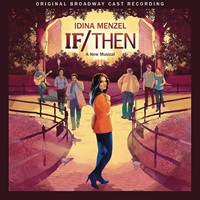 Original Broadway Cast, 2014 (Masterworks Broadway)
Original Broadway Cast, 2014 (Masterworks Broadway)  (2.5 / 5) At the time of its opening, If/Then was hailed as Idina Menzel’s return to the Broadway stage after starring in Wicked almost a decade earlier. Pairing her with writers Tom Kitt and Brian Yorkey, only a few years removed from Next to Normal, seemed like a sure bet for success. But, similar to other “sure bets,” If/Then ended up muddled. Kitt’s music and Yorkey’s lyrics are as nebulous and meandering as the show’s title might suggest, and the characters they created sound like ciphers as they travel down one too many narrative side streets in the show’s book, also written by Yorkey. Menzel’s character, known as “Beth” when she chooses one path for her life and as “Liz” when she makes a different choice, is assigned an expected amount of ballads, but the character’s indecisiveness leads to her singing in circles. As a result, listeners may find it difficult to care about Beth/Liz, and may struggle to follow the two separate story lines. All of that said, the cast of If/Then is spectacular, as Menzel is joined by LaChanze in the role of her friend Kate; Jenn Colella as Anne, Kate’s love interest; James Snyder as Josh, the father of Liz’s children; Menzel’s former Rent co-star Anthony Rapp as Lucas, a friend to Liz and more than a friend to Beth; and Jason Tam as David, who becomes Lucas’s boyfriend in one of the story lines. All of these performers’ voices are so distinct that they are instantly recognizable on this recording, in the best way. Unfortunately, their characters’ plotlines are soap-opera-level bad, and even a description of those subplots is difficult because of the show’s dueling realities. The album does end on with a string of memorable cuts: “Love While You Can” is a fascinating song for Menzel, LaChanze, and Colella; “What Would You Do?” is a sweet solo Tam; and the score culminates with a predictable, bloated, but undeniably cathartic “11 o’clock number” for Menzel titled “Always Starting Over.” Don’t be shocked if you find yourself returning to this particular track, if only to hear Menzel push herself to her vocal limit. —-Forrest Hutchinson
(2.5 / 5) At the time of its opening, If/Then was hailed as Idina Menzel’s return to the Broadway stage after starring in Wicked almost a decade earlier. Pairing her with writers Tom Kitt and Brian Yorkey, only a few years removed from Next to Normal, seemed like a sure bet for success. But, similar to other “sure bets,” If/Then ended up muddled. Kitt’s music and Yorkey’s lyrics are as nebulous and meandering as the show’s title might suggest, and the characters they created sound like ciphers as they travel down one too many narrative side streets in the show’s book, also written by Yorkey. Menzel’s character, known as “Beth” when she chooses one path for her life and as “Liz” when she makes a different choice, is assigned an expected amount of ballads, but the character’s indecisiveness leads to her singing in circles. As a result, listeners may find it difficult to care about Beth/Liz, and may struggle to follow the two separate story lines. All of that said, the cast of If/Then is spectacular, as Menzel is joined by LaChanze in the role of her friend Kate; Jenn Colella as Anne, Kate’s love interest; James Snyder as Josh, the father of Liz’s children; Menzel’s former Rent co-star Anthony Rapp as Lucas, a friend to Liz and more than a friend to Beth; and Jason Tam as David, who becomes Lucas’s boyfriend in one of the story lines. All of these performers’ voices are so distinct that they are instantly recognizable on this recording, in the best way. Unfortunately, their characters’ plotlines are soap-opera-level bad, and even a description of those subplots is difficult because of the show’s dueling realities. The album does end on with a string of memorable cuts: “Love While You Can” is a fascinating song for Menzel, LaChanze, and Colella; “What Would You Do?” is a sweet solo Tam; and the score culminates with a predictable, bloated, but undeniably cathartic “11 o’clock number” for Menzel titled “Always Starting Over.” Don’t be shocked if you find yourself returning to this particular track, if only to hear Menzel push herself to her vocal limit. —-Forrest Hutchinson
Category Archives: G-I
High Fidelity
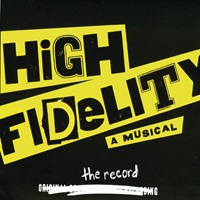 Original Broadway Cast, 2007 (Ghostlight)
Original Broadway Cast, 2007 (Ghostlight)  (2 / 5) This show is based on the 1995 novel of the same title, written by Nick Hornby, and the film version of the property that was produced in 2000 to a largely positive critical reception. The musical was created by Amanda Green (lyrics), Tom Kitt (music), and David Lindsay-Abaire (book), all of whom have bona fide Broadway credentials — and all of whom have worked on better shows than this misfire. The most obvious demerit of High Fidelity the musical is Amanda Green’s crude, sometimes tasteless lyric writing. (To be fair to Green, the show mostly revolves around a group of immature men who work at a record shop.) Though Tom Kitt’s original score ably parodies popular rock songs of the vinyl era, his music pales in comparison to the actual hits that were heard on the movie’s soundtrack; especially lamentable is a Bruce Springsteen rip-off, “Goodbye and Good Luck,” that includes a dreamy vision of Springsteen himself. And when Kitt does provide an uncommonly beautiful melody, it’s for a song saddled with the title “I Slept With Someone (Who Handled Kurt Cobain’s Intervention).” Will Chase as Rob, the narcissistic record shop owner, is forced to sing many of Green’s most questionable lyrics, but it’s wonderful to hear Jenn Colella, as Rob’s love interest Laura, in a leading role so early in her Broadway career. She’s incredibly touching in the finale track, even as Laura struggles to break free of the stereotypes this male-centric show forces upon its female characters. Through the muddle, there are some great moments on this recording: “The Last Real Record Store” is a strong opening number, and performers Jay Klaitz as Barry and Rachel Stern as Liz make strong positive impressions in their featured moments. — Forrest Hutchinson
(2 / 5) This show is based on the 1995 novel of the same title, written by Nick Hornby, and the film version of the property that was produced in 2000 to a largely positive critical reception. The musical was created by Amanda Green (lyrics), Tom Kitt (music), and David Lindsay-Abaire (book), all of whom have bona fide Broadway credentials — and all of whom have worked on better shows than this misfire. The most obvious demerit of High Fidelity the musical is Amanda Green’s crude, sometimes tasteless lyric writing. (To be fair to Green, the show mostly revolves around a group of immature men who work at a record shop.) Though Tom Kitt’s original score ably parodies popular rock songs of the vinyl era, his music pales in comparison to the actual hits that were heard on the movie’s soundtrack; especially lamentable is a Bruce Springsteen rip-off, “Goodbye and Good Luck,” that includes a dreamy vision of Springsteen himself. And when Kitt does provide an uncommonly beautiful melody, it’s for a song saddled with the title “I Slept With Someone (Who Handled Kurt Cobain’s Intervention).” Will Chase as Rob, the narcissistic record shop owner, is forced to sing many of Green’s most questionable lyrics, but it’s wonderful to hear Jenn Colella, as Rob’s love interest Laura, in a leading role so early in her Broadway career. She’s incredibly touching in the finale track, even as Laura struggles to break free of the stereotypes this male-centric show forces upon its female characters. Through the muddle, there are some great moments on this recording: “The Last Real Record Store” is a strong opening number, and performers Jay Klaitz as Barry and Rachel Stern as Liz make strong positive impressions in their featured moments. — Forrest HutchinsonHere Lies Love
 Studio Cast/Concept Album, 2010 (Nonesuch) No stars, not recommended. The controversial life of politician and former First Lady of the Philippines Imelda Marcos hardly seemed ripe for musical interpretation, and a disco opera detailing her rise to and fall from power seemed even more farfetched. But however unlikely, David Byrne (former lead singer for the band Talking Heads) and Fatboy Slim (musician and producer of electronic and indie rock music) collaborated to create Here Lies Love, originally presented to the world as a concept album that was released in 2010. The recording’s musical style is described by the writers as “disco club music,” a style chosen because of the real-life Imelda’s alleged fondness for it. The songs follow the central character and the woman who raised her, Estrella Cumpas, from Imelda’s upbringing as a poor girl to her rise as First Lady of the Philippines, continuing with her family’s forced evacuation from the country along with Ferdinand Marcos, her husband. (Marcos was controversial in his own right for the corruption, scandal, and human rights abuses that occurred during his time in office, from 1965 to 1986.) The album suffers from several issues that obscure the story the authors are attempting to tell. First, they can’t decide if Imelda Marcos is an ambitious, power-hungry temptress or merely an innocent pawn swept up in the political opportunity. And any attempt at storytelling is further marred by the plethora of pop artists enlisted to interpret the songs; the list of more than 20 singers on the album includes Florence Welch, Steve Earle, Cydni Lauper, Sia, and David Byrne himself. All of them perform competently, with Welch making the most of the maddeningly catchy title song, but each of the female artists portraying Imelda gives her a different characterization. The result is narrative whiplash — and that narrative is so loosely constructed that it’s impossible to discern who the characters are and what’s happening without consulting a plot summary. All told, this recording is an entertaining listen for curiosity’s sake, but it offers little value to fans of musical theater. — Forrest Hutchinson
Studio Cast/Concept Album, 2010 (Nonesuch) No stars, not recommended. The controversial life of politician and former First Lady of the Philippines Imelda Marcos hardly seemed ripe for musical interpretation, and a disco opera detailing her rise to and fall from power seemed even more farfetched. But however unlikely, David Byrne (former lead singer for the band Talking Heads) and Fatboy Slim (musician and producer of electronic and indie rock music) collaborated to create Here Lies Love, originally presented to the world as a concept album that was released in 2010. The recording’s musical style is described by the writers as “disco club music,” a style chosen because of the real-life Imelda’s alleged fondness for it. The songs follow the central character and the woman who raised her, Estrella Cumpas, from Imelda’s upbringing as a poor girl to her rise as First Lady of the Philippines, continuing with her family’s forced evacuation from the country along with Ferdinand Marcos, her husband. (Marcos was controversial in his own right for the corruption, scandal, and human rights abuses that occurred during his time in office, from 1965 to 1986.) The album suffers from several issues that obscure the story the authors are attempting to tell. First, they can’t decide if Imelda Marcos is an ambitious, power-hungry temptress or merely an innocent pawn swept up in the political opportunity. And any attempt at storytelling is further marred by the plethora of pop artists enlisted to interpret the songs; the list of more than 20 singers on the album includes Florence Welch, Steve Earle, Cydni Lauper, Sia, and David Byrne himself. All of them perform competently, with Welch making the most of the maddeningly catchy title song, but each of the female artists portraying Imelda gives her a different characterization. The result is narrative whiplash — and that narrative is so loosely constructed that it’s impossible to discern who the characters are and what’s happening without consulting a plot summary. All told, this recording is an entertaining listen for curiosity’s sake, but it offers little value to fans of musical theater. — Forrest Hutchinson
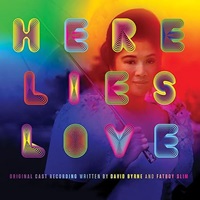 Original Off-Broadway Cast, 2013 (Nonesuch)
Original Off-Broadway Cast, 2013 (Nonesuch)  (1 / 5) It’s unfortunate that we have to judge the 2013 Off-Broadway production of Here Lies Love based solely on this audio recording, as the immersive presentation at The Public Theater was such a key part of its appeal. The show was sung-through, and some songs heard on the concept album were cut while others were added, to overall little effect. The cast album pulsates with synthesized beats, but similar to its predecessor, the songs become repetitive, without providing interesting lyrics or any understanding of the characters’ motives. Imelda is sung by the extremely talented Ruthie Ann Miles. She nails the title song, one of the many melodies that might get stuck in your head as you listen. Her voice cuts through the monotonous music, and though the role itself lacks depth, Miles is a consistently charismatic presence. Ferdinand Marcos is given an unremarkable performance by Jose Llana; surprisingly, Marcos is not the most prominently featured male character in the show; that would be Ninoy Aquino, a political reformer who had a relationship with Imelda when they were young, but who became one of the leading critics of the Marcos administration. (Think of Che in Evita.) Aquino is played by Conrad Ricamora, who gets to show off more emotional range than the others in songs such as “Child of the Philippines” and “Gate 37.” (This character largely replaces the role of the nanny, Estrella Cumpos on the concept album as a grounding presence in Imelda’s life and a reminder of her impoverished childhood.) The album is primarily an endless procession of funk music, interrupted briefly by the penultimate song, “God Draws Straight,” a soft melody accompanied by a single ukulele. The bulk of the score is better suited to a dance club setting than to close listening. If you can get your hands on a physical copy of the CD edition, it’s a colorful double-disc set that includes an 80 (!) page booklet with summaries for each track on the recording. Perhaps the feeling that it was necessary to include song summaries should be seen as an indication that prospective listeners may want to exercise caution. [Editor’s Note: A Broadway production of Here Lies Love, which attempted to recreate the immersive quality of the Off-Broadway presentation, opened in the summer of 2023. It ran for only 150 performances and three previews, and it yielded no cast album.] — F.H.
(1 / 5) It’s unfortunate that we have to judge the 2013 Off-Broadway production of Here Lies Love based solely on this audio recording, as the immersive presentation at The Public Theater was such a key part of its appeal. The show was sung-through, and some songs heard on the concept album were cut while others were added, to overall little effect. The cast album pulsates with synthesized beats, but similar to its predecessor, the songs become repetitive, without providing interesting lyrics or any understanding of the characters’ motives. Imelda is sung by the extremely talented Ruthie Ann Miles. She nails the title song, one of the many melodies that might get stuck in your head as you listen. Her voice cuts through the monotonous music, and though the role itself lacks depth, Miles is a consistently charismatic presence. Ferdinand Marcos is given an unremarkable performance by Jose Llana; surprisingly, Marcos is not the most prominently featured male character in the show; that would be Ninoy Aquino, a political reformer who had a relationship with Imelda when they were young, but who became one of the leading critics of the Marcos administration. (Think of Che in Evita.) Aquino is played by Conrad Ricamora, who gets to show off more emotional range than the others in songs such as “Child of the Philippines” and “Gate 37.” (This character largely replaces the role of the nanny, Estrella Cumpos on the concept album as a grounding presence in Imelda’s life and a reminder of her impoverished childhood.) The album is primarily an endless procession of funk music, interrupted briefly by the penultimate song, “God Draws Straight,” a soft melody accompanied by a single ukulele. The bulk of the score is better suited to a dance club setting than to close listening. If you can get your hands on a physical copy of the CD edition, it’s a colorful double-disc set that includes an 80 (!) page booklet with summaries for each track on the recording. Perhaps the feeling that it was necessary to include song summaries should be seen as an indication that prospective listeners may want to exercise caution. [Editor’s Note: A Broadway production of Here Lies Love, which attempted to recreate the immersive quality of the Off-Broadway presentation, opened in the summer of 2023. It ran for only 150 performances and three previews, and it yielded no cast album.] — F.H.
Hands on a Hardbody
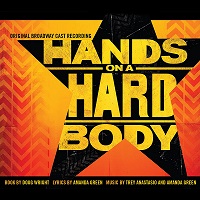 Original Broadway Cast, 2013 (Ghostlight)
Original Broadway Cast, 2013 (Ghostlight)  (3.5 / 5) With a score by Trey Anastasio and Amanda Green, and a book by Doug Wright, Hands on a Hardbody entertained audiences at the Brooks Atkinson Theater for only 28 performances in 2013, yet from the first twang on the cast album, we hear a distinctive blend of Country/Western music and bluesy rock. Based on a 1997 documentary that depicts a yearly competition in Texas wherein 24 contestants compete to win a truck by seeing who can keep a hand on the vehicle for the longest amount of time, the musical is a true ensemble piece; the cast of competitors includes Broadway favorite Hunter Foster alongside newcomer Keala Settle and TV, movie, and Broadway veteran Keith Carradine. Settle gives this album lots of gas, and she nearly stole the show onstage with her energetic gospel number, “Joy of the Lord.” Foster gets the 11 o’clock barn-burner “God Answered My Prayers,” and Carradine lends a gritty authenticity to his few vocal solos, especially the very touching “Used To Be.” The other contestants — played by Allison Case, Jay Armstrong Johnson, David Larsen, Jacob Ming-Trent, Kathleen Elizabeth Monteleone, Jon Rua, and Dale Soules — all get their moments to shine, following the tradition of such shows as A Chorus Line and Cats. Some listeners may pump the brakes when they hear the occasional use of slant rhymes (“Cassius/ashes,” “turnip/burn up”) in Green’s lyrics, and the recording does have quite a few clunkers and oddities; two examples are the finale, “Keep Your Hands On It,” which attempts sentimentality but with lyrics so bland that the song comes across as hokey, and “Uncontrollable Laughter,” in which we hear Settle’s religious-zealot character cackling for a full minute. But the better songs on this album are certainly worth sifting through the lesser ones, and the whole is greater than the sum of its parts. — Forrest Hutchinson
(3.5 / 5) With a score by Trey Anastasio and Amanda Green, and a book by Doug Wright, Hands on a Hardbody entertained audiences at the Brooks Atkinson Theater for only 28 performances in 2013, yet from the first twang on the cast album, we hear a distinctive blend of Country/Western music and bluesy rock. Based on a 1997 documentary that depicts a yearly competition in Texas wherein 24 contestants compete to win a truck by seeing who can keep a hand on the vehicle for the longest amount of time, the musical is a true ensemble piece; the cast of competitors includes Broadway favorite Hunter Foster alongside newcomer Keala Settle and TV, movie, and Broadway veteran Keith Carradine. Settle gives this album lots of gas, and she nearly stole the show onstage with her energetic gospel number, “Joy of the Lord.” Foster gets the 11 o’clock barn-burner “God Answered My Prayers,” and Carradine lends a gritty authenticity to his few vocal solos, especially the very touching “Used To Be.” The other contestants — played by Allison Case, Jay Armstrong Johnson, David Larsen, Jacob Ming-Trent, Kathleen Elizabeth Monteleone, Jon Rua, and Dale Soules — all get their moments to shine, following the tradition of such shows as A Chorus Line and Cats. Some listeners may pump the brakes when they hear the occasional use of slant rhymes (“Cassius/ashes,” “turnip/burn up”) in Green’s lyrics, and the recording does have quite a few clunkers and oddities; two examples are the finale, “Keep Your Hands On It,” which attempts sentimentality but with lyrics so bland that the song comes across as hokey, and “Uncontrollable Laughter,” in which we hear Settle’s religious-zealot character cackling for a full minute. But the better songs on this album are certainly worth sifting through the lesser ones, and the whole is greater than the sum of its parts. — Forrest Hutchinson
Honeymoon in Vegas
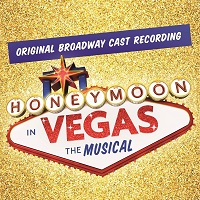 Original Broadway Cast, 2014 (Universal Music Enterprises)
Original Broadway Cast, 2014 (Universal Music Enterprises)  (2 / 5) The overture of Jason Robert Brown’s Honeymoon in Vegas tells us everything we need to know about the score: It’s full of showbiz razzmatazz, easy on the ears, yet overstuffed and largely generic. The opening number, “I Love Betsy,” is a list song that would’ve made Cole Porter proud, and has rightly become a beloved musical theater standard, but the score doesn’t have much farther to go. Given that the show’s story is deeply silly and farcical, the characters don’t have a lot to sing about, and Brown consistently stretches each emotion and musical moment to its fullest extent. As a result, even songs with clever ideas behind them, such as “Out of the Sun” (an ode to a wife who died from over-tanning) and “Airport Song” (a comic sequence about the difficulties of finding a flight) wear out their welcome. And though the snazzy, Vegas-style orchestrations by Don Sebesky serve the period nicely, they don’t do anything to help the sameness of the songs, especially when it comes to big group numbers. The show’s stars, Rob McClure and Brynn O’Malley, are charming, but neither of them are quite magnetic enough to sustain the piece as it starts to lag. Tony Danza is perfectly cast in the role of professional gambler Tommy Korman, and while he’s not a natural singer, he does have some great moments — one of them comes towards the end of the show, with “A Little Luck.” Featured performers including Nancy Opel and David Josefsberg do their best to sell their material, but there’s only so much you can do with tropes as tired as overbearing mothers and Elvis impersonators. Honeymoon in Vegas, true to its subject matter, may provide a nice vacation from the troubles of daily life, but since several other musical comedies exist that are far more intelligent about their silliness (Dirty Rotten Scoundrels, The Drowsy Chaperone, et al.), one couldn’t be blamed for deciding not to take this trip. — Charles Kirsch
(2 / 5) The overture of Jason Robert Brown’s Honeymoon in Vegas tells us everything we need to know about the score: It’s full of showbiz razzmatazz, easy on the ears, yet overstuffed and largely generic. The opening number, “I Love Betsy,” is a list song that would’ve made Cole Porter proud, and has rightly become a beloved musical theater standard, but the score doesn’t have much farther to go. Given that the show’s story is deeply silly and farcical, the characters don’t have a lot to sing about, and Brown consistently stretches each emotion and musical moment to its fullest extent. As a result, even songs with clever ideas behind them, such as “Out of the Sun” (an ode to a wife who died from over-tanning) and “Airport Song” (a comic sequence about the difficulties of finding a flight) wear out their welcome. And though the snazzy, Vegas-style orchestrations by Don Sebesky serve the period nicely, they don’t do anything to help the sameness of the songs, especially when it comes to big group numbers. The show’s stars, Rob McClure and Brynn O’Malley, are charming, but neither of them are quite magnetic enough to sustain the piece as it starts to lag. Tony Danza is perfectly cast in the role of professional gambler Tommy Korman, and while he’s not a natural singer, he does have some great moments — one of them comes towards the end of the show, with “A Little Luck.” Featured performers including Nancy Opel and David Josefsberg do their best to sell their material, but there’s only so much you can do with tropes as tired as overbearing mothers and Elvis impersonators. Honeymoon in Vegas, true to its subject matter, may provide a nice vacation from the troubles of daily life, but since several other musical comedies exist that are far more intelligent about their silliness (Dirty Rotten Scoundrels, The Drowsy Chaperone, et al.), one couldn’t be blamed for deciding not to take this trip. — Charles Kirsch
How to Dance in Ohio
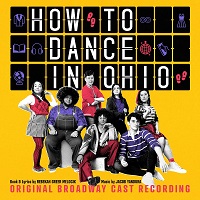 Original Broadway Cast, 2024 (Center Stage Records)
Original Broadway Cast, 2024 (Center Stage Records)  (2.5 / 5) It’s difficult to criticize the cast recording of a show that is so representative in its diversity and so bold in its subject matter. How to Dance in Ohio was powerful onstage, and also very meaningful to the autistic and neuro-divergent communities. It certainly deserves praise for its honest portrayal of a group of autistic young adults (played by autistic performers) who meet under the supervision of their counselor, Dr. Amigo. With a book and lyrics by Rebecca Greer Melocik, and music by Jacob Yandura, the show takes its title and general plot from a 2015 HBO documentary in which we see Dr. Amigo planning a formal dance to teach social skills to the group. Despite the obvious merits of the musical, the cast album rarely flows well, and unfortunately, the songs are musically undistinguished. “Today Is” proves to be a generic opening number, and though songs such as “Under Control,” “Unlikely Animals,” and “Waves and Wires” allow us to learn more about the inner minds of the characters, they don’t have memorable melodies. One thankful exception is a song performed by two mothers while preparing their daughters for the formal, “Getting Ready for the Dance.” (A heartbreaking sample of the lyrics: “So many things the other kids do, ours get ‘nevers,’ ‘nos,’ and ‘can’ts.’ I want a picture of my daughter getting ready for the dance.”) The ensemble cast members are universally laudable for their vulnerable performances on the album: Caesar Samayoa sounds uncannily similar to the real-life Dr. Amigo, Madison Kopec is just right as Marideth, and Liam Pierce as Drew highlights the recording with his 11 o’clock number, “Building Momentum.” — Forrest Hutchinson
(2.5 / 5) It’s difficult to criticize the cast recording of a show that is so representative in its diversity and so bold in its subject matter. How to Dance in Ohio was powerful onstage, and also very meaningful to the autistic and neuro-divergent communities. It certainly deserves praise for its honest portrayal of a group of autistic young adults (played by autistic performers) who meet under the supervision of their counselor, Dr. Amigo. With a book and lyrics by Rebecca Greer Melocik, and music by Jacob Yandura, the show takes its title and general plot from a 2015 HBO documentary in which we see Dr. Amigo planning a formal dance to teach social skills to the group. Despite the obvious merits of the musical, the cast album rarely flows well, and unfortunately, the songs are musically undistinguished. “Today Is” proves to be a generic opening number, and though songs such as “Under Control,” “Unlikely Animals,” and “Waves and Wires” allow us to learn more about the inner minds of the characters, they don’t have memorable melodies. One thankful exception is a song performed by two mothers while preparing their daughters for the formal, “Getting Ready for the Dance.” (A heartbreaking sample of the lyrics: “So many things the other kids do, ours get ‘nevers,’ ‘nos,’ and ‘can’ts.’ I want a picture of my daughter getting ready for the dance.”) The ensemble cast members are universally laudable for their vulnerable performances on the album: Caesar Samayoa sounds uncannily similar to the real-life Dr. Amigo, Madison Kopec is just right as Marideth, and Liam Pierce as Drew highlights the recording with his 11 o’clock number, “Building Momentum.” — Forrest Hutchinson
Hell’s Kitchen
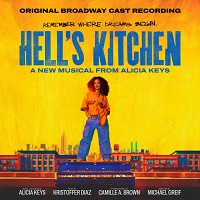 Original Broadway Cast, 2024 (Alicia Keys Records/Interscope)
Original Broadway Cast, 2024 (Alicia Keys Records/Interscope)  (4 / 5) Hell’s Kitchen is one jukebox musical — in this case, celebrating the artistry of R&B singer-songwriter Alicia Keys through the semi-autobiographical story of teenage rebel Ali (Maleah Joi Moon) — that receives a significant upgrade in the translation from stage to cast recording. On the one hand, the misguided inclusion here of substantial portions of dialogue gives us too much of the show’s paper-thin story and near non-existent character development. (The most frustrating track in this regard is “You Play These Notes” featuring a wildly silly and unconvincing piano pedagogy.) But also showcased are the extraordinary vocals and rousing arrangements of Keys’ songs that a shorter version of the album could have offered with fewer distractions. Rather than simply recreating the sound of Keys’ original hit recordings, Hell’s Kitchen reimagines them: the sped-up, jazzy take on “Fallin’” and the impassioned mother-daughter duet recrafting of “No One” are two exemplars. Keys penned four new songs, including the lovely “The River,” for the musical, but the bulk of the score consists of items familiar from nearly 25 years of her albums. As jukebox musicals go, this one boasts unusual orchestral reinvention; Tom Kitt and Adam Blackstone engage in symphonic spread with rich scoring for strings that never overwhelms the piano-driven gold at the core of Keys’ compositional mines. And there’s a generosity of spirit in Keys’ willingness to spread the wealth of her solo songbook to other vocal artists, an unselfishness rewarded by the four central performances well represented by numerous tracks on the album: the deliciously melismatic rasp of newcomer Moon’s “The River” and “Kaleidoscope,” the seductive syrup of Brandon Victor Dixon’s “Not Even the King” and “Fallin’,” the rafters-raising electricity of Shoshana Bean’s “Pawn It All” and “No One,” and, best of all, the richness and warmth of Kecia Lewis’ “Perfect Way to Die,” “Authors of Forever,” and “Like Water.” — Dan Rubins
(4 / 5) Hell’s Kitchen is one jukebox musical — in this case, celebrating the artistry of R&B singer-songwriter Alicia Keys through the semi-autobiographical story of teenage rebel Ali (Maleah Joi Moon) — that receives a significant upgrade in the translation from stage to cast recording. On the one hand, the misguided inclusion here of substantial portions of dialogue gives us too much of the show’s paper-thin story and near non-existent character development. (The most frustrating track in this regard is “You Play These Notes” featuring a wildly silly and unconvincing piano pedagogy.) But also showcased are the extraordinary vocals and rousing arrangements of Keys’ songs that a shorter version of the album could have offered with fewer distractions. Rather than simply recreating the sound of Keys’ original hit recordings, Hell’s Kitchen reimagines them: the sped-up, jazzy take on “Fallin’” and the impassioned mother-daughter duet recrafting of “No One” are two exemplars. Keys penned four new songs, including the lovely “The River,” for the musical, but the bulk of the score consists of items familiar from nearly 25 years of her albums. As jukebox musicals go, this one boasts unusual orchestral reinvention; Tom Kitt and Adam Blackstone engage in symphonic spread with rich scoring for strings that never overwhelms the piano-driven gold at the core of Keys’ compositional mines. And there’s a generosity of spirit in Keys’ willingness to spread the wealth of her solo songbook to other vocal artists, an unselfishness rewarded by the four central performances well represented by numerous tracks on the album: the deliciously melismatic rasp of newcomer Moon’s “The River” and “Kaleidoscope,” the seductive syrup of Brandon Victor Dixon’s “Not Even the King” and “Fallin’,” the rafters-raising electricity of Shoshana Bean’s “Pawn It All” and “No One,” and, best of all, the richness and warmth of Kecia Lewis’ “Perfect Way to Die,” “Authors of Forever,” and “Like Water.” — Dan Rubins
I Married an Angel
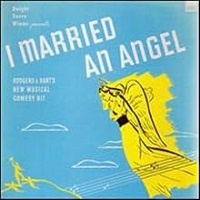 Original Broadway Cast Members and Radio Cast, 1985 (AEI Records)
Original Broadway Cast Members and Radio Cast, 1985 (AEI Records)  (4 / 5) I Married an Angel is a gem from the collection of Richard Rodgers and Lorenz Hart. Admittedly, it’s a slight musical; the plot concerns Count Willy Palaffi, who breaks off his engagement, stating that he will only “marry an angel.” Indeed, one flies down from heaven — complete with wings — and Willy learns to be careful what he wishes for. The only songs with a clear connection to the plot are the title song and “Angel Without Wings,” which consists mostly of rhyming dialogue. All the same, Rodgers and Hart supply a few lovely numbers that make this score a necessity for any musical theater fan. The highlight may be “A Twinkle in Your Eye,” a delightfully amoral ode to cheating and the ways that clever women can stay out of trouble, performed with vivacious flair by Wynn Murray. A wistful ballad, “Spring is Here,” also stands out, and it showcases the unique vocal quality of Eve Symington. The makeup of this album is unusual: It features six selections performed by members of the original Broadway cast and recorded by the Liberty Music Shop in 1938, plus a medley-cum-overture, played by popular pianists Cy Walter and Gil Bowers, that serves as the opening track. The five remaining numbers are taken from a 1952 radio production that starred the silver-voiced Gordon MacRae and the charming Lucille Norman. While both sets of excerpts are sung and orchestrated beautifully, this inconsistency makes the recording feel like it presents a series of musical vignettes rather than a complete score. But with music as good as this, why ask for anything more? — Charles Kirsch
(4 / 5) I Married an Angel is a gem from the collection of Richard Rodgers and Lorenz Hart. Admittedly, it’s a slight musical; the plot concerns Count Willy Palaffi, who breaks off his engagement, stating that he will only “marry an angel.” Indeed, one flies down from heaven — complete with wings — and Willy learns to be careful what he wishes for. The only songs with a clear connection to the plot are the title song and “Angel Without Wings,” which consists mostly of rhyming dialogue. All the same, Rodgers and Hart supply a few lovely numbers that make this score a necessity for any musical theater fan. The highlight may be “A Twinkle in Your Eye,” a delightfully amoral ode to cheating and the ways that clever women can stay out of trouble, performed with vivacious flair by Wynn Murray. A wistful ballad, “Spring is Here,” also stands out, and it showcases the unique vocal quality of Eve Symington. The makeup of this album is unusual: It features six selections performed by members of the original Broadway cast and recorded by the Liberty Music Shop in 1938, plus a medley-cum-overture, played by popular pianists Cy Walter and Gil Bowers, that serves as the opening track. The five remaining numbers are taken from a 1952 radio production that starred the silver-voiced Gordon MacRae and the charming Lucille Norman. While both sets of excerpts are sung and orchestrated beautifully, this inconsistency makes the recording feel like it presents a series of musical vignettes rather than a complete score. But with music as good as this, why ask for anything more? — Charles Kirsch
The Great Gatsby
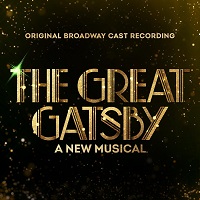 Original Broadway Cast, 2024 (Sony Masterworks Broadway)
Original Broadway Cast, 2024 (Sony Masterworks Broadway)  (0.5 / 5) As F. Scott Fitzgerald’s famous and revered novel The Great Gatsby lapsed into the public domain, it was perhaps inevitable that stage adaptations would begin to appear. This musical version had the good fortune of employing two extremely talented vocalists, Jeremy Jordan (Newsies, Bonnie and Clyde, etc. ) as Jay Gatsby and Eva Noblezada (Miss Saigon, Hadestown) as Daisy Buchanan. Noblezada was cast against type for this role, yet she comes across better than Jordan on the recording, finding genuine emotion in songs such as “For Better or Worse” and “Beautiful Little Fool.” Though Jordan’s singing voice is distinctive in ballads including “For Her,” his accent in his spoken dialogue sounds out of place. And while John Zdrojeski and Sara Chase are well cast as Tom Buchanan and Myrtle, respectively, Noah Ricketts struggles in the role of Nick. The story of Gatsby’s pursuit of the married Daisy is narrated in the novel and the musical by Nick, who has just returned home from serving in World War I, and who also plays a key role in the unfolding drama as he carries on a romance with professional golfer Jordan Baker (Samantha Pauly). Nick is the audience’s reporter on the show’s primary subjects and themes: the tragedy hidden behind the decadence of the Roaring ’20s in America, the life of the mysterious Gatsby, and the everlasting hope or the unreachable dream represented by a single green light in the distance. But narration is much more difficult to execute in a stage show than in a novel, and Nick’s lines often feel shoehorned into the musical. The score for this adaptation was written by Jason Howland (music) and Nathan Tysen (lyrics), and the book by Kait Kerrigan. Howland is not untalented; his melodies for the songs “For Her,” “Only Tea,” and “Past is Catching Up to Me” are enjoyable, and “My Green Light” plays well as the obligatory, highly-anticipated duet between the two leads. But some of Tysen’s lyrics are of shockingly poor quality. For example, in the song “One-Way Road,” a pregnant Myrtle sings “Though I’m not showing, a baby’s growing,” along with “He’s mine, and this baby here is genuine.” Lyrics like these prevent the recording from gaining any real momentum, and further, the score as a whole is structured so generically that some listeners may be able to predict the type and style of each successive song before it plays. Although the standout visuals of this show’s physical production and the presence of two bankable musical theater notables may keep the party moving well enough on stage, this Great Gatsby‘s lack of nuance is clear from the cast album, especially in comparison to the source material. — Forrest Hutchinson
(0.5 / 5) As F. Scott Fitzgerald’s famous and revered novel The Great Gatsby lapsed into the public domain, it was perhaps inevitable that stage adaptations would begin to appear. This musical version had the good fortune of employing two extremely talented vocalists, Jeremy Jordan (Newsies, Bonnie and Clyde, etc. ) as Jay Gatsby and Eva Noblezada (Miss Saigon, Hadestown) as Daisy Buchanan. Noblezada was cast against type for this role, yet she comes across better than Jordan on the recording, finding genuine emotion in songs such as “For Better or Worse” and “Beautiful Little Fool.” Though Jordan’s singing voice is distinctive in ballads including “For Her,” his accent in his spoken dialogue sounds out of place. And while John Zdrojeski and Sara Chase are well cast as Tom Buchanan and Myrtle, respectively, Noah Ricketts struggles in the role of Nick. The story of Gatsby’s pursuit of the married Daisy is narrated in the novel and the musical by Nick, who has just returned home from serving in World War I, and who also plays a key role in the unfolding drama as he carries on a romance with professional golfer Jordan Baker (Samantha Pauly). Nick is the audience’s reporter on the show’s primary subjects and themes: the tragedy hidden behind the decadence of the Roaring ’20s in America, the life of the mysterious Gatsby, and the everlasting hope or the unreachable dream represented by a single green light in the distance. But narration is much more difficult to execute in a stage show than in a novel, and Nick’s lines often feel shoehorned into the musical. The score for this adaptation was written by Jason Howland (music) and Nathan Tysen (lyrics), and the book by Kait Kerrigan. Howland is not untalented; his melodies for the songs “For Her,” “Only Tea,” and “Past is Catching Up to Me” are enjoyable, and “My Green Light” plays well as the obligatory, highly-anticipated duet between the two leads. But some of Tysen’s lyrics are of shockingly poor quality. For example, in the song “One-Way Road,” a pregnant Myrtle sings “Though I’m not showing, a baby’s growing,” along with “He’s mine, and this baby here is genuine.” Lyrics like these prevent the recording from gaining any real momentum, and further, the score as a whole is structured so generically that some listeners may be able to predict the type and style of each successive song before it plays. Although the standout visuals of this show’s physical production and the presence of two bankable musical theater notables may keep the party moving well enough on stage, this Great Gatsby‘s lack of nuance is clear from the cast album, especially in comparison to the source material. — Forrest Hutchinson
Here We Are
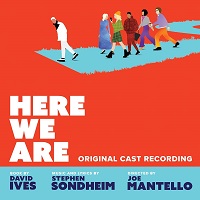 Off-Broadway Cast, 2024 (Concord Theatricals)
Off-Broadway Cast, 2024 (Concord Theatricals)  (4.5 / 5) As staged Off-Broadway at The Shed in late 2023, Sondheim’s final musical — which combines two Luis Buñuel films to create one story about a group of wealthy friends who struggle all day to find a place to eat and then can’t leave the room — offered strange, surreal satisfaction. The cast album of Here We Are captures the show’s bizarreness while still showcasing the small-scale treasures of Sondheim’s last songs. The wise inclusion on the recording of significant patches of David Ives’ book scenes (there is very little music in the second act) helps to capture the show’s shifting flavors, even if parts of the story will likely remain inscrutable to some listeners. Sondheim’s music sometimes goes beyond evoking his past work; certain sections seem to quote Passion and Sunday in the Park with George outright. But there are worse things than revisiting some of his most wistful melodic gestures, and there are moments in this score that suggest a self-referential wink, too. His lyrics remain outstandingly specific to character in their rhythms, vocabulary, and grammar, particularly in the comic “Bishop’s Song” for a character (played by David Hyde Pierce) who would rather be working in another field, and in the show’s most glistening addition to the canon, the aria “Shine” for Marianne (Rachel Bay Jones). “I want things to gleam / To be what they seem / And not what they are,” she sings in one of Sondheim’s last perfect constructions. It’s not his most densely rhymed score, nor his most unimpeachable; for example, a parodically mournful ballad, “It Is What It Is,” for Tracie Bennett (doing a ridiculous French accent), misfires on the recording as it did onstage. But Sondheim clearly relishes the unique weirdnesses of each of his characters, and sometimes gives them notably lush, romantic melodies as in “The Soldier’s Dream,” sung brightly by Jin Ha and Micaela Diamond. (The most frustrating aspect of the album is how often the richest music is interrupted by spoken asides referencing stage business by other characters, doing little to clarify or enrich those moments.) While Here We Are is a true ensemble piece, Jones is especially delightful in animating Marianne’s willful ignorance masquerading as innocence, and lovely as she sounds when singing, it’s the recorded book scenes that demonstrate the complexities she squeezes out of a defiantly superficial character, as when she makes a meal out of delicious consonants in sultry, silly lines such as “I found you a credenza for your embassy.” Perhaps more than anything else, this score in album form is a testament to the 50-year-plus collaboration between orchestrator Jonathan Tunick and Sondheim. The recording not only exquisitely communicates Tunick’s sumptuous, quirky, and always dramatically motivated treatment of Sondheim’s compositions but also demonstrates, through the inclusion of several Act II interludes and the substantial, shimmering exit music, how lovingly Tunick developed those melodies in instrumental sections presumably constructed after Sondheim’s death. (The entr’acte, for instance, fleshes out a gorgeous, brief melody sung by Steven Pasquale in “The Road 4 — Part 2.”) When it comes to that partnership, to quote Marianne, “Don’t we all feel blessed?” — Dan Rubins
(4.5 / 5) As staged Off-Broadway at The Shed in late 2023, Sondheim’s final musical — which combines two Luis Buñuel films to create one story about a group of wealthy friends who struggle all day to find a place to eat and then can’t leave the room — offered strange, surreal satisfaction. The cast album of Here We Are captures the show’s bizarreness while still showcasing the small-scale treasures of Sondheim’s last songs. The wise inclusion on the recording of significant patches of David Ives’ book scenes (there is very little music in the second act) helps to capture the show’s shifting flavors, even if parts of the story will likely remain inscrutable to some listeners. Sondheim’s music sometimes goes beyond evoking his past work; certain sections seem to quote Passion and Sunday in the Park with George outright. But there are worse things than revisiting some of his most wistful melodic gestures, and there are moments in this score that suggest a self-referential wink, too. His lyrics remain outstandingly specific to character in their rhythms, vocabulary, and grammar, particularly in the comic “Bishop’s Song” for a character (played by David Hyde Pierce) who would rather be working in another field, and in the show’s most glistening addition to the canon, the aria “Shine” for Marianne (Rachel Bay Jones). “I want things to gleam / To be what they seem / And not what they are,” she sings in one of Sondheim’s last perfect constructions. It’s not his most densely rhymed score, nor his most unimpeachable; for example, a parodically mournful ballad, “It Is What It Is,” for Tracie Bennett (doing a ridiculous French accent), misfires on the recording as it did onstage. But Sondheim clearly relishes the unique weirdnesses of each of his characters, and sometimes gives them notably lush, romantic melodies as in “The Soldier’s Dream,” sung brightly by Jin Ha and Micaela Diamond. (The most frustrating aspect of the album is how often the richest music is interrupted by spoken asides referencing stage business by other characters, doing little to clarify or enrich those moments.) While Here We Are is a true ensemble piece, Jones is especially delightful in animating Marianne’s willful ignorance masquerading as innocence, and lovely as she sounds when singing, it’s the recorded book scenes that demonstrate the complexities she squeezes out of a defiantly superficial character, as when she makes a meal out of delicious consonants in sultry, silly lines such as “I found you a credenza for your embassy.” Perhaps more than anything else, this score in album form is a testament to the 50-year-plus collaboration between orchestrator Jonathan Tunick and Sondheim. The recording not only exquisitely communicates Tunick’s sumptuous, quirky, and always dramatically motivated treatment of Sondheim’s compositions but also demonstrates, through the inclusion of several Act II interludes and the substantial, shimmering exit music, how lovingly Tunick developed those melodies in instrumental sections presumably constructed after Sondheim’s death. (The entr’acte, for instance, fleshes out a gorgeous, brief melody sung by Steven Pasquale in “The Road 4 — Part 2.”) When it comes to that partnership, to quote Marianne, “Don’t we all feel blessed?” — Dan RubinsGutenberg! The Musical
 Original Off-Broadway Cast, 2009 (PS Classics)
Original Off-Broadway Cast, 2009 (PS Classics)  (2.5 / 5) Scott Brown and Anthony King developed this two-person comic gem about two composers writing a musical. The fictional writers have created a show portraying Johannes Gutenberg and the invention of the printing press to help a town’s illiterate populace. This recording features in the roles of the two aspiring writers Christopher Fitzgerald as Bud Davenport and Jeremy Shamos as Doug Simon. Bud and Doug are very sincere, but their show is very bad. Nevertheless, they are pitching it to audiences and (they hope) to “famous Broadway producers.” Unfortunately, since this is just a reading and they don’t have a cast yet, Bud and Doug are forced to play all of the parts themselves, including the title role as well as an evil monk, a lovely young woman (aptly named Helvetica), and all of the other various townspeople. This potentially confusing premise is kept afloat by distinctive performances from Fitzgerald and Shamos, who take on unique accents and personas for each of the characters. On stage, the actors would don hats bearing the character names or descriptions to help make it clear to the audience whom they were playing at any given moment, speedily switching from one to another, and while these visual gags can’t be seen on the recording, it’s a credit to the duo that listeners could almost forget that this was a two-person show when listening through the cast album. While the material is enjoyable, it is slight; the comedy is hit-or-miss, and there are crass jokes about dead babies, anti-Semitic flower girls, and even suicide. In the end, the songs most often prompt unfavorable comparisons to other scores: for example, Urinetown comments on itself more cleverly, while [title of show] breaks the fourth wall more effectively. Still, the “plot” of Gutenberg! The Musical is delightfully wacky, crazy enough to keep you laughing but just grounded enough to make you think that someone out there might possibly think the show within this show would be a good idea. — Forrest Hutchinson
(2.5 / 5) Scott Brown and Anthony King developed this two-person comic gem about two composers writing a musical. The fictional writers have created a show portraying Johannes Gutenberg and the invention of the printing press to help a town’s illiterate populace. This recording features in the roles of the two aspiring writers Christopher Fitzgerald as Bud Davenport and Jeremy Shamos as Doug Simon. Bud and Doug are very sincere, but their show is very bad. Nevertheless, they are pitching it to audiences and (they hope) to “famous Broadway producers.” Unfortunately, since this is just a reading and they don’t have a cast yet, Bud and Doug are forced to play all of the parts themselves, including the title role as well as an evil monk, a lovely young woman (aptly named Helvetica), and all of the other various townspeople. This potentially confusing premise is kept afloat by distinctive performances from Fitzgerald and Shamos, who take on unique accents and personas for each of the characters. On stage, the actors would don hats bearing the character names or descriptions to help make it clear to the audience whom they were playing at any given moment, speedily switching from one to another, and while these visual gags can’t be seen on the recording, it’s a credit to the duo that listeners could almost forget that this was a two-person show when listening through the cast album. While the material is enjoyable, it is slight; the comedy is hit-or-miss, and there are crass jokes about dead babies, anti-Semitic flower girls, and even suicide. In the end, the songs most often prompt unfavorable comparisons to other scores: for example, Urinetown comments on itself more cleverly, while [title of show] breaks the fourth wall more effectively. Still, the “plot” of Gutenberg! The Musical is delightfully wacky, crazy enough to keep you laughing but just grounded enough to make you think that someone out there might possibly think the show within this show would be a good idea. — Forrest Hutchinson
 Broadway Cast, 2024 (Broadway Records)
Broadway Cast, 2024 (Broadway Records)  (2 / 5) The first Broadway production of Gutenberg! reunited former Book of Mormon co-stars Andrew Rannells and Josh Gad, giving them another excellent vehicle to showcase their comedic chemistry and range. As is typical when an Off-Broadway show goes to Broadway, there were some things lost, some things gained. This cast album is longer than the Off-Broadway recording, which at 58 minutes in length was already threatening to outwear its welcome. The additional 10 minutes of material to be found here strain a listener’s goodwill. On the other hand, the spoken dialogue that’s included has been cleverly modified to address listeners to the recording rather than live audience members, and the new jokes are mostly an improvement over those in the previous iteration. Most likely, one’s enjoyment of this album will be closely linked to one’s affinity for Rannells and Gad. They are appropriately earnest as Bud and Doug. and fully committed to each of their bit parts. The best songs are Helvetica’s love ballad, “I Can’t Read,” which contains some expert comedy lyrics; the stereotypical Act 1 Finale, “Tomorrow Is Tonight”; and the deliciously evil “Monk With Me.” On Broadway, the show featured different celebrity guest stars at each performance, playing the famous Broadway producer who offers Bud and Doug their Broadway contract. Mel Brooks was chosen to appear in that brief role on the album, and he’s a wonderful choice for it. — F.H.
(2 / 5) The first Broadway production of Gutenberg! reunited former Book of Mormon co-stars Andrew Rannells and Josh Gad, giving them another excellent vehicle to showcase their comedic chemistry and range. As is typical when an Off-Broadway show goes to Broadway, there were some things lost, some things gained. This cast album is longer than the Off-Broadway recording, which at 58 minutes in length was already threatening to outwear its welcome. The additional 10 minutes of material to be found here strain a listener’s goodwill. On the other hand, the spoken dialogue that’s included has been cleverly modified to address listeners to the recording rather than live audience members, and the new jokes are mostly an improvement over those in the previous iteration. Most likely, one’s enjoyment of this album will be closely linked to one’s affinity for Rannells and Gad. They are appropriately earnest as Bud and Doug. and fully committed to each of their bit parts. The best songs are Helvetica’s love ballad, “I Can’t Read,” which contains some expert comedy lyrics; the stereotypical Act 1 Finale, “Tomorrow Is Tonight”; and the deliciously evil “Monk With Me.” On Broadway, the show featured different celebrity guest stars at each performance, playing the famous Broadway producer who offers Bud and Doug their Broadway contract. Mel Brooks was chosen to appear in that brief role on the album, and he’s a wonderful choice for it. — F.H.The Gardens of Anuncia
 Original Off-Broadway Cast, 2024 (Ghostlight)
Original Off-Broadway Cast, 2024 (Ghostlight)  (4.5 / 5) From the shimmery first notes of The Gardens of Anuncia, listeners will get the feeling they’re entering a magical land. What follows is a gem of a show that tells the story of the upbringing of the great Broadway choreographer Graciela Daniele. (The character here closely based on Daniele is known as Anuncia.) The roles of the three women who raised Daniele, known as “Mami,” “Grandmama,” and “Tia,” are brought to vivid life by Michael John LaChiusa’s extravagant melodies and precise lyrics, and the performers of these roles provide the listener with great gifts: the soaring vocals of Eden Espinosa (Mami), the undeniable charm of Andrea Burns (Tia), and the singular combination of brashness and heart possessed by Mary Testa as Grandmama. (Who else could bring you to the verge of tears with the lyrics “Eat your macaroni!/I don’t want you to be hungry?”) The title role is played dually by Priscilla Lopez, who provides the proper serenity and charm in narrating the show as the older Anuncia, and Kalyn West, who does an admirable job as the innocent, young version of the character, being taught the ways of the world by her three female mentors. The show risks feeling saccharine towards the beginning, as most of the early songs are simply depictions of the happy lives of the four women. But the music is never uninteresting — listeners should not be surprised if they find themselves humming the opening refrain about “Mami, Grandmama, Tia, and me.” The show takes a sharp left turn once Anuncia’s mother is taken as a political prisoner; in “The Vigil,” LaChiusa’s haunting music does justice to the confusion and anxiety every member of the family must have felt during that difficult time. And in “The Story of That Man,” Anuncia stops serving as a secondary character to the women who raised her, coming to the forefront as she shares the traumatic and limited memories she has of her father. Lovely diversions from these more serious moments are provided by two singing deer, both played by Tally Sessions, who appear in the older Anuncia’s garden to impart an important life lesson: “Dance while you can.” Sessions brings a vaudevillian touch to the proceedings, and these numbers brilliantly fit with the rest of the score despite their surface silliness. This show never feels like a vanity project, but Daniele’s ultimate mission in creating it is clear throughout: To give the three strong women who raised her their due. That goal is accomplished with special beauty in the finale, “Never a Goodbye,” in which older Anuncia finally buries the ashes of her aunt. Considering this recording’s many delights, no listener will be sorry that they let LaChiusa and Daniele lead them down this garden path. — Charles Kirsch
(4.5 / 5) From the shimmery first notes of The Gardens of Anuncia, listeners will get the feeling they’re entering a magical land. What follows is a gem of a show that tells the story of the upbringing of the great Broadway choreographer Graciela Daniele. (The character here closely based on Daniele is known as Anuncia.) The roles of the three women who raised Daniele, known as “Mami,” “Grandmama,” and “Tia,” are brought to vivid life by Michael John LaChiusa’s extravagant melodies and precise lyrics, and the performers of these roles provide the listener with great gifts: the soaring vocals of Eden Espinosa (Mami), the undeniable charm of Andrea Burns (Tia), and the singular combination of brashness and heart possessed by Mary Testa as Grandmama. (Who else could bring you to the verge of tears with the lyrics “Eat your macaroni!/I don’t want you to be hungry?”) The title role is played dually by Priscilla Lopez, who provides the proper serenity and charm in narrating the show as the older Anuncia, and Kalyn West, who does an admirable job as the innocent, young version of the character, being taught the ways of the world by her three female mentors. The show risks feeling saccharine towards the beginning, as most of the early songs are simply depictions of the happy lives of the four women. But the music is never uninteresting — listeners should not be surprised if they find themselves humming the opening refrain about “Mami, Grandmama, Tia, and me.” The show takes a sharp left turn once Anuncia’s mother is taken as a political prisoner; in “The Vigil,” LaChiusa’s haunting music does justice to the confusion and anxiety every member of the family must have felt during that difficult time. And in “The Story of That Man,” Anuncia stops serving as a secondary character to the women who raised her, coming to the forefront as she shares the traumatic and limited memories she has of her father. Lovely diversions from these more serious moments are provided by two singing deer, both played by Tally Sessions, who appear in the older Anuncia’s garden to impart an important life lesson: “Dance while you can.” Sessions brings a vaudevillian touch to the proceedings, and these numbers brilliantly fit with the rest of the score despite their surface silliness. This show never feels like a vanity project, but Daniele’s ultimate mission in creating it is clear throughout: To give the three strong women who raised her their due. That goal is accomplished with special beauty in the finale, “Never a Goodbye,” in which older Anuncia finally buries the ashes of her aunt. Considering this recording’s many delights, no listener will be sorry that they let LaChiusa and Daniele lead them down this garden path. — Charles Kirsch
I Can’t Keep Running in Place
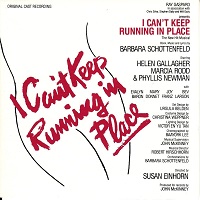 Original Off-Broadway Cast, 1981 (Painted Smiles)
Original Off-Broadway Cast, 1981 (Painted Smiles)  (1 / 5) This musical about a six-week women’s assertiveness training workshop came across as little more than an audition piece for Barbara Schottenfeld, who wrote the book, music, and lyrics. The songs are decent enough, sincere and spirited, even if the music disappears from your mind the moment after you’ve heard it. But the book just isn’t there, and the characters are minimally delineated: the rich and acerbic one, the fat one, the smug student, the doormat, and so on. They occasionally take part in telephone conversations about husbands and children, but mostly they sing one song after another. As performed by Helen Gallagher, Joy Franz, Evalyn Baron, Phyllis Newman, and especially Marcia Rodd in the role of the troubled therapists, the musical numbers are momentarily effective but, without plot or characters to back them up, they’re out there on their own — David Wolf
(1 / 5) This musical about a six-week women’s assertiveness training workshop came across as little more than an audition piece for Barbara Schottenfeld, who wrote the book, music, and lyrics. The songs are decent enough, sincere and spirited, even if the music disappears from your mind the moment after you’ve heard it. But the book just isn’t there, and the characters are minimally delineated: the rich and acerbic one, the fat one, the smug student, the doormat, and so on. They occasionally take part in telephone conversations about husbands and children, but mostly they sing one song after another. As performed by Helen Gallagher, Joy Franz, Evalyn Baron, Phyllis Newman, and especially Marcia Rodd in the role of the troubled therapists, the musical numbers are momentarily effective but, without plot or characters to back them up, they’re out there on their own — David Wolf
Half-Past Wednesday/Rumpelstiltskin
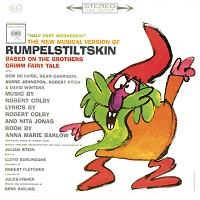 Original Off-Broadway Cast, 1962 (Columbia/no CD) No stars, not recommended. The success of Once Upon a Mattress inspired several other fairy tale musicals, including this one — but the authors of Mattress knew how to adapt their source material for the stage so that it would appeal to adults. In contrast, the writers of Half-Past Wednesday — Robert Colby, Nita Jones, and Anna Marie Barlow — took the story of Rumpelstiltskin and changed almost nothing. This is the original tale: straight, unadorned, and very involving if you’re six years old. The songs aren’t even run-of-the-mill in quality, there’s not a fresh idea to be found here, and despite the fact that the score contains a number of supposedly comic songs, there are no jokes. Columbia tried to repackage and retitle this LP to sell it as a children’s album, but it’s not even clever enough for kids, and they’ll hate the soppy love songs. The most notable member of the cast is Dom DeLuise, most of whose mannerisms were in place by the time of this recording. — David Wolf
Original Off-Broadway Cast, 1962 (Columbia/no CD) No stars, not recommended. The success of Once Upon a Mattress inspired several other fairy tale musicals, including this one — but the authors of Mattress knew how to adapt their source material for the stage so that it would appeal to adults. In contrast, the writers of Half-Past Wednesday — Robert Colby, Nita Jones, and Anna Marie Barlow — took the story of Rumpelstiltskin and changed almost nothing. This is the original tale: straight, unadorned, and very involving if you’re six years old. The songs aren’t even run-of-the-mill in quality, there’s not a fresh idea to be found here, and despite the fact that the score contains a number of supposedly comic songs, there are no jokes. Columbia tried to repackage and retitle this LP to sell it as a children’s album, but it’s not even clever enough for kids, and they’ll hate the soppy love songs. The most notable member of the cast is Dom DeLuise, most of whose mannerisms were in place by the time of this recording. — David Wolf
Greenwich Village U.S.A.
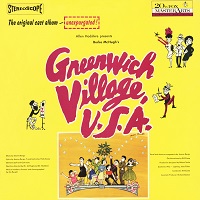 Original Off-Broadway Cast, 1960 (20th Century Fox/no CD) No stars, not recommended. Some people have a blind affection for 1950s and ’60s revues, but being blind doesn’t mean that you have to be deaf, too. There isn’t anything in Greenwich Village U.S.A. that’s worth five seconds of your time. Although the section of New York City that’s the subject of this review was admittedly more distinctive in the ’50s that it has been in later years, it was never exactly Borneo, yet the authors of this show consistently depict its residents as some rare breed of exotics. That basic lack of honesty is one main reason why nothing here is funny. Another reason is the sheer lack of talent displayed in the writing. Those responsible for this fiasco were Jeanne Bargy, composer-lyricist; Frank Gehrecke, book writer-lyricist; and Herb Corey, lyricist. The only item of (minor) interest in this recording is that one of the performers, ballad singer Dawn Hampton, was an early influence on Bette Midler — David Wolf
Original Off-Broadway Cast, 1960 (20th Century Fox/no CD) No stars, not recommended. Some people have a blind affection for 1950s and ’60s revues, but being blind doesn’t mean that you have to be deaf, too. There isn’t anything in Greenwich Village U.S.A. that’s worth five seconds of your time. Although the section of New York City that’s the subject of this review was admittedly more distinctive in the ’50s that it has been in later years, it was never exactly Borneo, yet the authors of this show consistently depict its residents as some rare breed of exotics. That basic lack of honesty is one main reason why nothing here is funny. Another reason is the sheer lack of talent displayed in the writing. Those responsible for this fiasco were Jeanne Bargy, composer-lyricist; Frank Gehrecke, book writer-lyricist; and Herb Corey, lyricist. The only item of (minor) interest in this recording is that one of the performers, ballad singer Dawn Hampton, was an early influence on Bette Midler — David Wolf
Harmony
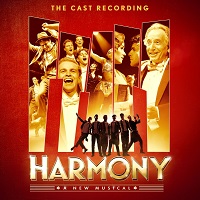 Original Broadway Cast, 2023 (Sh-K-Boom)
Original Broadway Cast, 2023 (Sh-K-Boom)  (4 / 5) It took Barry Manilow and Bruce Sussman’s musical Harmony 26 years to get to Broadway, over four times as long a period as the Comedian Harmonists themselves performed across the globe before being fractured by the Nazi regime. What we have here is not only a recounting of the sad but true story of that group but also a tribute to musical theater itself, with various songs reminiscent of the work of Gilbert & Sullivan, Sondheim, and Bock & Harnick (“The Wedding” has to be one of the most effective uses of traditional-sounding Jewish melodies since Fiddler on the Roof ). For that matter, the 11 o’clock number ends with a dramatic rendition of the “Sh’ma,” in what may be a knowing nod to Jason Robert Brown’s Parade. The young men who play the Comedian Harmonists, including Sean Bell and Danny Kornfeld as the two who seem most central to the plot, unquestionably produce skillful and satisfying harmonies, even if the timbre of their voices doesn’t quite suggest the era in which the show is set. Chip Zien, as an older version of one of the group, is tasked with narrating the show, and his gravitas helps to balance out some of the less powerful lyrics. Two of the cast recording’s strongest points are the expert vocal performances of Julie Benko and Sierra Boggess, whose duet “Where You Go” is haunting and memorable; one only wishes they had more to do on the album. The songs range from sarcastic comments on the Nazi regime (“Come to the Fatherland”) to imitations of flimsy 1930s numbers (“We’re Going Loco,” which hews closely to Manilow’s hit “Copacabana”), and are made more enjoyable by the rich, snazzy orchestrations of Doug Walter. While this score may not be unique enough to merit a place of high honor in the canon, many listeners will agree that the 26-year journey paid off. — Charles Kirsch
(4 / 5) It took Barry Manilow and Bruce Sussman’s musical Harmony 26 years to get to Broadway, over four times as long a period as the Comedian Harmonists themselves performed across the globe before being fractured by the Nazi regime. What we have here is not only a recounting of the sad but true story of that group but also a tribute to musical theater itself, with various songs reminiscent of the work of Gilbert & Sullivan, Sondheim, and Bock & Harnick (“The Wedding” has to be one of the most effective uses of traditional-sounding Jewish melodies since Fiddler on the Roof ). For that matter, the 11 o’clock number ends with a dramatic rendition of the “Sh’ma,” in what may be a knowing nod to Jason Robert Brown’s Parade. The young men who play the Comedian Harmonists, including Sean Bell and Danny Kornfeld as the two who seem most central to the plot, unquestionably produce skillful and satisfying harmonies, even if the timbre of their voices doesn’t quite suggest the era in which the show is set. Chip Zien, as an older version of one of the group, is tasked with narrating the show, and his gravitas helps to balance out some of the less powerful lyrics. Two of the cast recording’s strongest points are the expert vocal performances of Julie Benko and Sierra Boggess, whose duet “Where You Go” is haunting and memorable; one only wishes they had more to do on the album. The songs range from sarcastic comments on the Nazi regime (“Come to the Fatherland”) to imitations of flimsy 1930s numbers (“We’re Going Loco,” which hews closely to Manilow’s hit “Copacabana”), and are made more enjoyable by the rich, snazzy orchestrations of Doug Walter. While this score may not be unique enough to merit a place of high honor in the canon, many listeners will agree that the 26-year journey paid off. — Charles Kirsch
How to Steal an Election
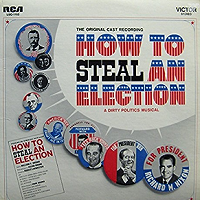 Original Off-Broadway Cast, 1968 (RCA/no CD)
Original Off-Broadway Cast, 1968 (RCA/no CD)  (2 / 5) A young black man (Clifton Davis) and a young white woman (Carole Demas), both veterans of the disastrous 1968 Democratic National Convention in Chicago, somehow meet Calvin Coolidge (D.R. Allen), who essentially gives them a lesson in the various forms of chicanery that resulted in the election of many American presidents. Combining authentic songs from past political campaigns with Oscar Brand’s new book songs for the two young idealists, How to Steal an Election has Cal trying to convince the kids that at least some trickery is necessary for the system to work. (After the young woman sings “Mr. Might’ve Been,” about President Kennedy, Coolidge reveals that her hero was not above some questionable political maneuvers.) The new songs are of varying quality, the old songs are interesting and sometimes funny, and the show’s subject matter is surprisingly topical in the early years of the 21st century. But, of course, the lesson imparted here — that stealing elections is somehow a good thing — is highly debatable. — David Wolf
(2 / 5) A young black man (Clifton Davis) and a young white woman (Carole Demas), both veterans of the disastrous 1968 Democratic National Convention in Chicago, somehow meet Calvin Coolidge (D.R. Allen), who essentially gives them a lesson in the various forms of chicanery that resulted in the election of many American presidents. Combining authentic songs from past political campaigns with Oscar Brand’s new book songs for the two young idealists, How to Steal an Election has Cal trying to convince the kids that at least some trickery is necessary for the system to work. (After the young woman sings “Mr. Might’ve Been,” about President Kennedy, Coolidge reveals that her hero was not above some questionable political maneuvers.) The new songs are of varying quality, the old songs are interesting and sometimes funny, and the show’s subject matter is surprisingly topical in the early years of the 21st century. But, of course, the lesson imparted here — that stealing elections is somehow a good thing — is highly debatable. — David Wolf
Half a Sixpence
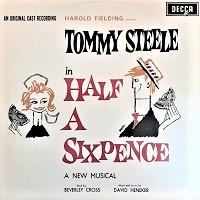 Original London Cast, 1963 (Decca/Must Close Saturday)
Original London Cast, 1963 (Decca/Must Close Saturday)  (3 / 5) There’s no question that Half A Sixpence, the musical adaptation of the H. G. Wells novel Kipps, was all about spotlighting Tommy Steele, the British singer, guitarist, and banjo boy who won teenage hearts in the late 1950s before turning to theater. Steele brings gregarious energy to the role of Arthur Kipps, a hard-working orphan who inherits a surprise fortune that leads him astray. (You can almost hear his grin through your speakers.) But although he may be the scene-Steeler here, the real star is David Heneker’s utterly lovely, music hall-inspired score, buoyed by the sweeping orchestrations of Arthur Wilkinson and Peter Knight and well conducted by Kenneth Alwyn. Marti Webb plays Arthur’s down-to-earth childhood sweetheart Ann with Cockney brassiness; the role would diminish a bit in subsequent productions, but Webb makes a meal of the substantial material she’s given here. Anna Barry as Ann’s rival, Helen, has a quirky operatic song, “The Oak and the Ash,” which would be gone by the time the show reached Broadway. And though this original London cast album doesn’t give us the most electric of Steele’s recorded performances in the role, it preserves a number of songs that aren’t available anywhere else in their original form, such as the Blue Danubey waltz “The Old Military Canal,” the gently bouncing duet “The One That’s Run Away” (which would be repurposed for the 2016 revisal), and a lengthy, two-part counterpoint number, “I’ll Build A Palace”/”I Only Want A Little House,” that seems like a British precursor to “An Old-Fashioned Wedding,” written by Irving Berlin for the 1966 Lincoln Center revival of Annie Get Your Gun. — Dan Rubins
(3 / 5) There’s no question that Half A Sixpence, the musical adaptation of the H. G. Wells novel Kipps, was all about spotlighting Tommy Steele, the British singer, guitarist, and banjo boy who won teenage hearts in the late 1950s before turning to theater. Steele brings gregarious energy to the role of Arthur Kipps, a hard-working orphan who inherits a surprise fortune that leads him astray. (You can almost hear his grin through your speakers.) But although he may be the scene-Steeler here, the real star is David Heneker’s utterly lovely, music hall-inspired score, buoyed by the sweeping orchestrations of Arthur Wilkinson and Peter Knight and well conducted by Kenneth Alwyn. Marti Webb plays Arthur’s down-to-earth childhood sweetheart Ann with Cockney brassiness; the role would diminish a bit in subsequent productions, but Webb makes a meal of the substantial material she’s given here. Anna Barry as Ann’s rival, Helen, has a quirky operatic song, “The Oak and the Ash,” which would be gone by the time the show reached Broadway. And though this original London cast album doesn’t give us the most electric of Steele’s recorded performances in the role, it preserves a number of songs that aren’t available anywhere else in their original form, such as the Blue Danubey waltz “The Old Military Canal,” the gently bouncing duet “The One That’s Run Away” (which would be repurposed for the 2016 revisal), and a lengthy, two-part counterpoint number, “I’ll Build A Palace”/”I Only Want A Little House,” that seems like a British precursor to “An Old-Fashioned Wedding,” written by Irving Berlin for the 1966 Lincoln Center revival of Annie Get Your Gun. — Dan Rubins
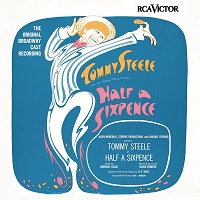 Original Broadway Cast, 1965 (RCA)
Original Broadway Cast, 1965 (RCA)  (4 / 5) Judging from the cast album, the original London production of Half a Sixpence already seemed like The Tommy Steele Show, and the cuts and additions made for Broadway took that to the next level: Steele sings in all but one song on this recording. Once again, charm ripples across David Heneker’s melodies — now with even more gorgeous orchestrations from Jim Tyler, best known for La Cage aux Folles — especially in the lilting title song and a sweet ballad, “Long Ago,” for Arthur and Ann (Polly James). While the show is overstuffed with ensemble numbers (“The Party’s On The House,” added for the Broadway production and including a weirdly American-sounding swing section, is least essential), most of them are pleasant listens, with dance arrangements and orchestrations by Robert Prince. “If the Rain’s Gonna Fall” is an especially jubilant, strolling tune that showcases Heneker’s lyric-writing aptitude, so jovial that the occasional oddball rhyme can be forgiven. “What could be wetter or damper / Than to sit on a picnic hamper / Sipping a sasparilla / Underneath the leaky umbrella?” croon Steele and the cast, and it’s totally delightful. Equally rewarding are the instrumental gems scattered throughout the album — for example, Steele’s dextrous banjo solo in “Money to Burn,” a touching flute and violin duet in the middle of “Long Ago,” and the short but sumptuous overture. — D.R.
(4 / 5) Judging from the cast album, the original London production of Half a Sixpence already seemed like The Tommy Steele Show, and the cuts and additions made for Broadway took that to the next level: Steele sings in all but one song on this recording. Once again, charm ripples across David Heneker’s melodies — now with even more gorgeous orchestrations from Jim Tyler, best known for La Cage aux Folles — especially in the lilting title song and a sweet ballad, “Long Ago,” for Arthur and Ann (Polly James). While the show is overstuffed with ensemble numbers (“The Party’s On The House,” added for the Broadway production and including a weirdly American-sounding swing section, is least essential), most of them are pleasant listens, with dance arrangements and orchestrations by Robert Prince. “If the Rain’s Gonna Fall” is an especially jubilant, strolling tune that showcases Heneker’s lyric-writing aptitude, so jovial that the occasional oddball rhyme can be forgiven. “What could be wetter or damper / Than to sit on a picnic hamper / Sipping a sasparilla / Underneath the leaky umbrella?” croon Steele and the cast, and it’s totally delightful. Equally rewarding are the instrumental gems scattered throughout the album — for example, Steele’s dextrous banjo solo in “Money to Burn,” a touching flute and violin duet in the middle of “Long Ago,” and the short but sumptuous overture. — D.R.
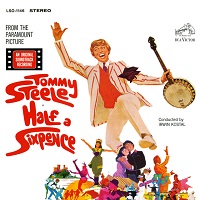 Film Soundtrack, 1968 (RCA; no CD) No stars, not recommended. All the joys of this score and in Tommy Steele’s performance can be found on the original Broadway cast recording, so there’s no need to brave the bloated soundtrack of the 1967 film adaptation in which Steele resurrected his banjo-toting Arthur Kipps. Here, every production number is extended towards eternity — “Money to Burn,” “If the Rain’s Got to Fall,” and “Flash, Bang, Wallop!” are now each seven minutes long — and whatever cinematographic choices merited such garish supersizing are obviously absent from the listening experience. Meanwhile, several songs have been cut and replaced, but of the new material, only Steele’s jaunty “Lady Botting’s Boating Regatta Cup Racing Song,” co-written by the legendary orchestrator Irwin Kostal, is worth checking out. Otherwise, Kostal’s jangly arrangements — far from his finest work — feature extensive circus and martial sounds, marching bands, and a tacky a cappella choral opening. Marti Webb, the original Ann in London, dubs Julia Foster’s singing in that role, but her soundtrack performance lacks grit: “I Know What I Am,” for instance, is plaintive and whimpery instead of boldly assertive. As for co-star Cyril Ritchard, a hammy upside of the film, his voice is basically unidentifiable on this album. Even Steele’s banjo solos here sound more interminable than impressive. — D.R.
Film Soundtrack, 1968 (RCA; no CD) No stars, not recommended. All the joys of this score and in Tommy Steele’s performance can be found on the original Broadway cast recording, so there’s no need to brave the bloated soundtrack of the 1967 film adaptation in which Steele resurrected his banjo-toting Arthur Kipps. Here, every production number is extended towards eternity — “Money to Burn,” “If the Rain’s Got to Fall,” and “Flash, Bang, Wallop!” are now each seven minutes long — and whatever cinematographic choices merited such garish supersizing are obviously absent from the listening experience. Meanwhile, several songs have been cut and replaced, but of the new material, only Steele’s jaunty “Lady Botting’s Boating Regatta Cup Racing Song,” co-written by the legendary orchestrator Irwin Kostal, is worth checking out. Otherwise, Kostal’s jangly arrangements — far from his finest work — feature extensive circus and martial sounds, marching bands, and a tacky a cappella choral opening. Marti Webb, the original Ann in London, dubs Julia Foster’s singing in that role, but her soundtrack performance lacks grit: “I Know What I Am,” for instance, is plaintive and whimpery instead of boldly assertive. As for co-star Cyril Ritchard, a hammy upside of the film, his voice is basically unidentifiable on this album. Even Steele’s banjo solos here sound more interminable than impressive. — D.R.
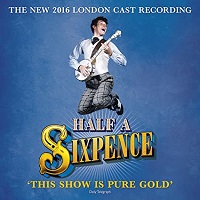 London Cast, 2016 (Exallshow Ltd)
London Cast, 2016 (Exallshow Ltd)  (1 / 5) Captured as a live recording, the aggressive revisal of Half a Sixpence that opened in 2016 at the Chichester Festival in England and later transferred to London’s West End largely drained the score of its sweet wittiness. As George Stiles and Anthony Drew had done with the stage adaptation of Mary Poppins a few years earlier, the team here again added numerous songs of their own to a pre-existing score while revising many of the originals. (There was also a brand-new book, by Downton Abbey’s Julian Fellowes.) Unfortunately, the new songs sound quite a bit like the ones that Stiles and Drew came up with for Poppins (the first two new numbers, “Look Alive” and “Believe In Yourself,” are almost rip-offs of “Cherry Tree Lane” and “Anything Can Happen”) but not at all like the work of David Heneker. And the eight and a half songs that do survive from the 1960s (“I Know Who I Am” is sadly truncated) are largely stripped of their warmth; William David Brohn’s orchestrations radiate slick bombast but seldom the tender charm of the originals. Charlie Stemp had a giddily agile presence and exuded a mix of puppy-dog innocence and deer-in-the-headlights bewilderment as Arthur Kipps on stage, but on record, he lacks the dynamic energy — not to mention the banjo skills — of Tommy Steele. Because this is a live album compiled from multiple performances during the show’s Chichester Festival Theatre run, before the West End transfer, each number is followed by lengthy applause that detracts from the listening experience, as does audience laughter at staging we can’t see. — D.R.
(1 / 5) Captured as a live recording, the aggressive revisal of Half a Sixpence that opened in 2016 at the Chichester Festival in England and later transferred to London’s West End largely drained the score of its sweet wittiness. As George Stiles and Anthony Drew had done with the stage adaptation of Mary Poppins a few years earlier, the team here again added numerous songs of their own to a pre-existing score while revising many of the originals. (There was also a brand-new book, by Downton Abbey’s Julian Fellowes.) Unfortunately, the new songs sound quite a bit like the ones that Stiles and Drew came up with for Poppins (the first two new numbers, “Look Alive” and “Believe In Yourself,” are almost rip-offs of “Cherry Tree Lane” and “Anything Can Happen”) but not at all like the work of David Heneker. And the eight and a half songs that do survive from the 1960s (“I Know Who I Am” is sadly truncated) are largely stripped of their warmth; William David Brohn’s orchestrations radiate slick bombast but seldom the tender charm of the originals. Charlie Stemp had a giddily agile presence and exuded a mix of puppy-dog innocence and deer-in-the-headlights bewilderment as Arthur Kipps on stage, but on record, he lacks the dynamic energy — not to mention the banjo skills — of Tommy Steele. Because this is a live album compiled from multiple performances during the show’s Chichester Festival Theatre run, before the West End transfer, each number is followed by lengthy applause that detracts from the listening experience, as does audience laughter at staging we can’t see. — D.R.
The Glorious Ones
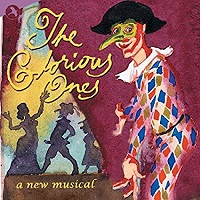 Original Off-Broadway Cast, 2008 (JAY)
Original Off-Broadway Cast, 2008 (JAY)  (3 / 5) The commedia dell’arte players who are the characters in Lynn Ahrens and Stephen Flaherty’s musical The Glorious Ones declare in the titular opening number that they will perform “with one hand on the crotch and one hand on the heart.” But Ahrens and Flaherty, from Once On This Island to Ragtime to Seussical, have been all blissful heart, and the songs in this score that strive for coarseness (“Making Love,” “Armanda’s Tarantella”) come across as semi-apologetic gropes. Flaherty’s flexible compositional voice usually molds artfully around the setting and style of each show, but The Glorious Ones never quite embraces a Flahertian version of 17th-century Italy. For example, the vaudevillian “Comedy of Love” and “Rise and Fall” sound a lot like Ragtime’s turn-of-the-century showbiz scenes. What is consistent about the score is the use of triple meter; like A Little Night Music, almost every song is in some variation of waltz time, although the lovely ballad “The World She Writes,” a metrical exception featuring the lush-voiced Erin Davie, is the album’s best track. By the time we arrive at the show’s apex, the impresario Flaminio Scala’s post-mortem soliloquy “I Was Here,” that song in three-quarter time rhythmically blends into too much of what’s come before. Still, Flaherty is a masterful melodist, and Ahrens is ever-thoughtful and clear in her lyrics, so the score never grates. As Flaminio and his lover Columbina, Marc Kudisch and Natalie Venetia Belcon get the meatiest music, but Julyana Soelistyo as the dwarf Armanda, leading the potent “Armanda’s Sack,” makes the most lasting impression. Michael Starobin’s orchestrations shimmer characteristically, especially in his gentle brass writing. The album features a few bonus tracks, including a brief orchestral suite. — Dan Rubins
(3 / 5) The commedia dell’arte players who are the characters in Lynn Ahrens and Stephen Flaherty’s musical The Glorious Ones declare in the titular opening number that they will perform “with one hand on the crotch and one hand on the heart.” But Ahrens and Flaherty, from Once On This Island to Ragtime to Seussical, have been all blissful heart, and the songs in this score that strive for coarseness (“Making Love,” “Armanda’s Tarantella”) come across as semi-apologetic gropes. Flaherty’s flexible compositional voice usually molds artfully around the setting and style of each show, but The Glorious Ones never quite embraces a Flahertian version of 17th-century Italy. For example, the vaudevillian “Comedy of Love” and “Rise and Fall” sound a lot like Ragtime’s turn-of-the-century showbiz scenes. What is consistent about the score is the use of triple meter; like A Little Night Music, almost every song is in some variation of waltz time, although the lovely ballad “The World She Writes,” a metrical exception featuring the lush-voiced Erin Davie, is the album’s best track. By the time we arrive at the show’s apex, the impresario Flaminio Scala’s post-mortem soliloquy “I Was Here,” that song in three-quarter time rhythmically blends into too much of what’s come before. Still, Flaherty is a masterful melodist, and Ahrens is ever-thoughtful and clear in her lyrics, so the score never grates. As Flaminio and his lover Columbina, Marc Kudisch and Natalie Venetia Belcon get the meatiest music, but Julyana Soelistyo as the dwarf Armanda, leading the potent “Armanda’s Sack,” makes the most lasting impression. Michael Starobin’s orchestrations shimmer characteristically, especially in his gentle brass writing. The album features a few bonus tracks, including a brief orchestral suite. — Dan Rubins
Inner City
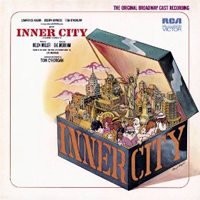 Original Broadway Cast, 1971 (RCA/Masterworks Broadway)
Original Broadway Cast, 1971 (RCA/Masterworks Broadway)  (4 / 5) Perhaps the source material was too obscure for audiences to really understand this show, which only ran on Broadway for 97 performances (and 24 previews). What poet Eve Merriam originally wrote was Inner City Mother Goose, a new take on nursery rhymes from an urban, sometimes violent perspective. So the familiar “Fee Fi Fo Fum” was followed by the less-expected “I smell the blood of violence to come,” while “Now I lay me down to sleep” was followed by “and I pray the double lock will keep.” Helen Miller set the poems to theatrical rock music. Most of them last a minute or less, but they’re memorable minutes. In “Hushabye Baby,” an unwed teenager sings about the child she’ll soon have, and it sounds like something that Brecht and Weill might have written had they been around in the early 1970s. Other highlights include “On This Rock,” a statement of urban pride; the jaunty “City Life”; and the pulsating “Law and Order,” which the TV series of the same title should have used as its theme song. “Deep in the Night” and “It’s My Belief” are solid anthems that helped win Linda Hopkins a Tony Award as Best Featured Actress. Then there’s “The Hooker,” in which a prostitute sings, “If they want to hear a story, then I give out with a story…I need ten dollars for grandma, who is coughing and spitting up blood. But whaddaya say we cut the crap?” The same socko melody is used for both “The Pusher” and “The Pickpocket,” but that last one didn’t make the album. That’s all right, we should be very grateful that this short-running show yielded a cast recording at all. — Peter Filichia
(4 / 5) Perhaps the source material was too obscure for audiences to really understand this show, which only ran on Broadway for 97 performances (and 24 previews). What poet Eve Merriam originally wrote was Inner City Mother Goose, a new take on nursery rhymes from an urban, sometimes violent perspective. So the familiar “Fee Fi Fo Fum” was followed by the less-expected “I smell the blood of violence to come,” while “Now I lay me down to sleep” was followed by “and I pray the double lock will keep.” Helen Miller set the poems to theatrical rock music. Most of them last a minute or less, but they’re memorable minutes. In “Hushabye Baby,” an unwed teenager sings about the child she’ll soon have, and it sounds like something that Brecht and Weill might have written had they been around in the early 1970s. Other highlights include “On This Rock,” a statement of urban pride; the jaunty “City Life”; and the pulsating “Law and Order,” which the TV series of the same title should have used as its theme song. “Deep in the Night” and “It’s My Belief” are solid anthems that helped win Linda Hopkins a Tony Award as Best Featured Actress. Then there’s “The Hooker,” in which a prostitute sings, “If they want to hear a story, then I give out with a story…I need ten dollars for grandma, who is coughing and spitting up blood. But whaddaya say we cut the crap?” The same socko melody is used for both “The Pusher” and “The Pickpocket,” but that last one didn’t make the album. That’s all right, we should be very grateful that this short-running show yielded a cast recording at all. — Peter Filichia

